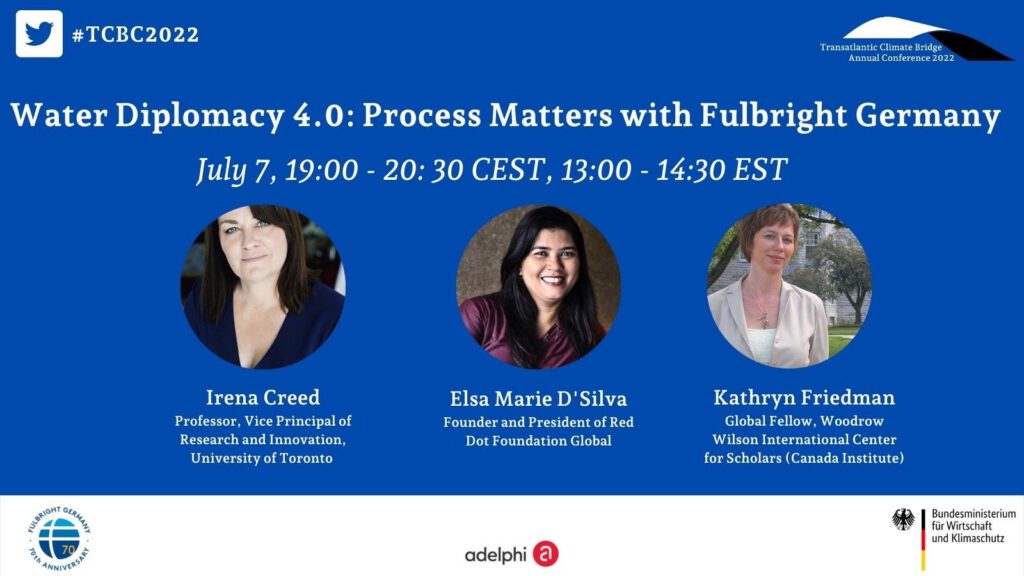Blog
Water Diplomacy 4.0 – Hope Is on the Horizon
“Where does the water in your tap come from?” Around thought-provoking questions like this one, an intensive discussion on the issue of water insecurity unfolded when GDL members Kathryn Bryk Friedman and Elsa Marie D’Silva together with Prof Irena Creed, a professor of hyrdology, presented their vision on Water Diplomacy 4.0 at the Transatlantic Climate Bridge Conference hosted by the Germany-based think tank adelphi.
Human Activity disrupts Global Water Cycle
In the eyes of transboundary water expert Kathryn, water insecurity is “one of a handful of global grand challenges society in the 21st century is facing.” In support of that analysis, Irena presented a case on “Geopolitics of Forest Water – Unchartered Territory”, talking about the role of forests in the global water cycle. She highlighted the urgency of the issue by stating that “water systems across the globe are under severe stress, threatening the lives and livelihood of billions of people who live in […] transboundary water systems”. In her presentation, Irena referred to many interconnections of the global water cycle and gave the solemn warning that “climate change combined with human activity is disrupting the global water cycle” – disruptions that are “being manifested both at local and global scales.” According to her analysis, “humans are effectively replumbing the global water cycle”, a process that will result in “an increased risk of water insecurity”.
GDL Member Elsa elegantly summed up the issue of mismanagement of water supplies in transboundary water systems by proclaiming that “business as usual just doesn’t work. And it doesn’t work because we are trying to solve 21st century problems with 19th century theories and 20th century institutions.” Kathryn not only agrees, but believes it is finally time “to reimagine a new vision for transboundary water systems” and together with GDL Members and experts of transboundary water systems “co-create new ways to get there”.
Scenario Analysis and Water Toolkit to tackle Water Insecurity
Answering her call, in June 2022 a diverse group of diplomats and experts came together to discuss five case studies that represent examples of transboundary water conflict and cooperation during the Incubator Lab “Water Diplomacy 4.0 – Process Matters” in Berlin. One of many promising and innovative approaches to tackle the issue of water insecurity is scenario analysis. For scenario analysis, certain drivers of change must be identified and based on these a pathway towards an envisioned future is mapped out.
To achieve a desired scenario in a certain transboundary water system, the right diplomatic tools must be developed and then applied. Therefore, the goal for the upcoming Impact Lab in Slovenia in August is to create an innovative and inclusive ‘Water Diplomacy 4.0 Process Toolkit’ that will be presented for review to experts of water governance and diplomats from around the world.
Co-Creating the Future: Panel Discussion at Youth Bled Strategic Forum
Even more exciting, the Lab team was able to secure a panel at the Young Bled Strategic Forum, also taking place in Slovenia in August. In Kathryn’s words, they will bring the fruits of the participants’ labour “to the people who are going to be co-creating that future with us – […] young people who have to deal with [the consequences of] all the challenges that we are facing in all of our societies today”. She hopes to get feedback on the vision of Water Diplomacy 4.0 from “the people who really matter”.
Irena brilliantly summarised her first GDL experience by stating that in her 25 years of being an academic, she would count the Incubator Lab in Berlin “in the top three of all meetings” she has been to “in terms of leaving there with a sense of hope, with a sense of purpose, with a sense of colleagues that are all aligned in the same direction to really affect the change that we urgently need.” So, there is hope on the horizon. Hope to the billions of people affected by water insecurity.
About the author:
Published on July 20, 2022.
Image credit: adelphi
